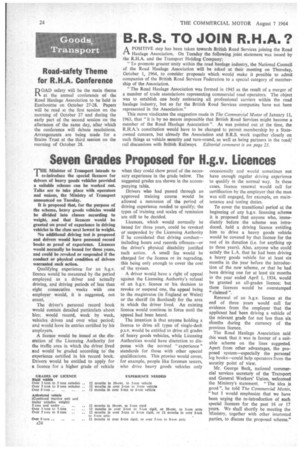Seven Grades Proposed for H.g.v. Licences
Page 26

If you've noticed an error in this article please click here to report it so we can fix it.
ThMinister of Transport intends to reE -introduce the special licences for drivers of heavy goods vehicles provided a suitable scheme can be worked out. Talks are to take place with operators and unions, the Ministry of Transport announced on Tuesday.
It is proposed that, for the purpose of the scheme, heavy goods vehicles would be divided into classes according to weight, and that licences would be granted on proof of experience in driving vehicles in the class next lowest in weight.
No additional driving test is proposed and drivers would have personal record books as proof of experience. Licences would normally be issued for three years, and could be revoked or suspended if the conduct or physical condition of drivers warranted such action.
Qualifying experience for an h.g.v. licence would be measured by the period employed as a driver and actually driving, and driving periods of less than eight consecutive weeks with one employer would, it is suggested, not count.
The driver's personal record book would contain detailed particulars about him; would record, week by week, vehicles driven and over what period; and would have its entries certified by his employers.
A licence would be issued at the discretion of the Licensing Authority for the traffic area in which the driver lived and would be graded according to the experience certified in his record book. Drivers would be entitled to apply for a licence for a higher grade of vehicle
when they could show proof of the necessary experience in the grade below. The suggested grades are shown in the accompanying table.
Drivers who had passed through an approved training course would be allowed a remission of the period of driving experience needed to qualify; the types of training and scales of remission are still to be decided.
Licences, which would normally be issued for three years, could be revoked or suspended by the Licensing Authority if he considered that driving conduct— including hours and records offences—or the driver's physical disability justified such action. A small fee would be charged for the licence or its regrading, this being only enough to cover the cost of the system.
A driver would have a right of appeal against the Licensing Authority's refusal of an h.g.v. licence or his decision to revoke or suspend one, the appeal being to the magistrates (in England or Wales) or the sheriff (in Scotland) for the area in which the driver lived. An existing licence would continue in force until the appeal had been heard.
The intention is that anyone holding a licence to drive all types of single-deck p.s.v. would be entitled to drive all grades of heavy goods vehicles, while Licensing Authorities would have discretion to dispense with the normal " experience " standards for those with other special qualifications. This proviso would cover, for example, people like foremen testers, who drive heavy goods vehicles only occasionally and would sometimes not have enough regular driving experience to qualify in the normal way. In these cases, licence renewal would call for certification by the employer that the man was still engaged, for example, on maintenance and testing duties.
To cover the transitional period at the beginning of any h.g.v. licensing scheme it is proposed that anyone who, immediately before the scheme was introduced, held a driving licence entitling him to drive a heavy goods vehicle would be covered by that licence for the rest of its duration (Le. for anything up to three years). Also, anyone who could satisfy the L.A. that he had been driving a heavy goods vehicle for at least six months in the year before the introduction of the new scheme, or that he had been driving one for at least six months in the year ended April 1, 1934, would be granted an all-grades licence; but these licences would be overstamped " claimed".
Renewal of an h.g.v. licence at the end of three years would call for evidence from the employer that the applicant had been driving a vehicle of the relevant grade for not less than six Months during the currency of the previous licence.
The Road Haulage Association said this week that it was in favour of a suitable scheme on the lines suggested. Apart from other advantages, the proposed system—especially the personal log books—could help operators from the security point of view.
Mr. George Beck, national commercial services secretary of the Transport and General Workers' Union, welcomed the Ministry's statement. "The idea is good ", he told The Commercial Motor, "but I would emphasize that we have been urging the re-introduction of such special licences for the past 16 or 17 years. We shall shortly be meeting the Ministry, together with other interested parties, to discuss the proposed scheme."
























































































































